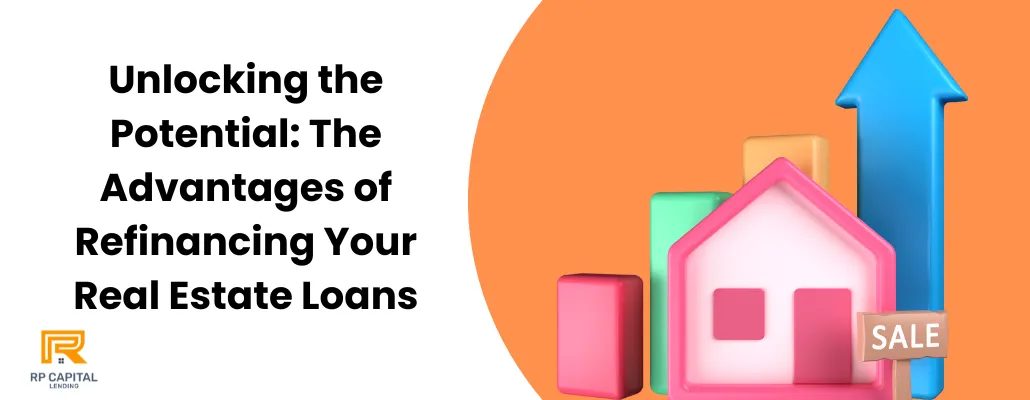Blog

Unlocking the Potential: The Advantages of Refinancing Your Real Estate Loans
In today's ever-changing financial landscape, mastering the art of refinancing your real estate loan can be your golden ticket to a more secure financial future.
Imagine slashing your monthly payments, tapping into your home's equity for that much-needed renovation, or even paying off your mortgage years ahead of schedule.
This guide will illuminate the path to not just surviving but thriving by leveraging the strategic benefits of refinancing. Join us on this journey to unlock the hidden potential within your real estate investment.
Understanding Refinancing
Refinancing involves replacing your existing mortgage with a new one, often with better terms. This strategic move can lead to significant savings and financial advantages. By securing a loan with more favorable conditions, homeowners can enjoy lower interest rates, reduced monthly payments, or even alter the loan's term. It's an opportunity to adjust your mortgage according to your current financial goals and market conditions, offering a pathway to improved financial health.
Key Benefits of Refinancing
Lower Interest Rates
Securing a lower interest rate through refinancing can significantly decrease the amount of interest paid over the life of the loan. This reduction in interest not only lowers monthly payments but also increases the equity you build in your home faster. It's a financially savvy move that can save thousands of dollars.
Reduced Monthly Payments
Refinancing for a lower interest rate or longer loan term can reduce your monthly mortgage payments, freeing up cash for other expenses or investments. This additional financial flexibility can help homeowners manage their budgets more effectively and allocate funds toward other priorities.
Shortened Loan Terms
Refinancing can also allow homeowners to shorten their loan term, which means paying off the mortgage sooner. While this may increase monthly payments, it significantly reduces the total interest paid over the life of the loan, offering long-term financial benefits.
Debt Consolidation
Refinancing provides an opportunity to consolidate multiple debts into a single, more manageable loan with a lower interest rate. This can simplify monthly payments and potentially save money on interest, making it easier to manage your finances.
Access to Equity
Homeowners can access the equity built up in their property through a cash-out refinance. This option allows you to borrow more than you owe on your current mortgage and use the extra cash for home improvements, education, or other significant expenses.
When to Refinance Your Real Estate Loan
The decision to refinance should be based on market conditions, your current financial situation, and your long-term goals. Ideal times to refinance include when interest rates drop significantly below your current rate, or when changes in your financial situation or goals make different loan terms more appealing.
How to Refinance Your Real Estate Loan
The refinancing process involves several steps: assessing your current financial situation to ensure refinancing is beneficial, comparing rates and terms from multiple lenders, applying for the new mortgage, and finally, closing the deal. Each step is crucial in securing the best terms possible.
Costs Associated with Refinancing
Refinancing is not without costs, including closing fees, application fees, and potentially prepayment penalties on your existing mortgage. These costs should be carefully weighed against the potential savings to determine if refinancing is a financially prudent decision.
Mistakes to Avoid
When refinancing, avoid common pitfalls such as not shopping around for the best rates, overlooking long-term impacts, and overestimating potential savings. Being mindful of these can lead to a more successful refinancing experience.
Future of Real Estate Refinancing
The refinancing landscape is continually evolving, with new trends and technologies shaping the process. Staying informed about these changes can help homeowners make better refinancing decisions in the future.
Conclusion
Refinancing offers a range of financial benefits, from lower interest rates to access to equity. However, it's a decision that requires careful consideration and planning. By understanding the process, costs, and timing, homeowners can make strategic refinancing decisions that align with their financial goals.
FAQs
1. What is the best time to refinance?
When interest rates are significantly lower than your current rate, or when your financial situation has improved enough to qualify for better terms.
2. How does my credit score affect refinancing?
A higher credit score can help you secure lower interest rates, making refinancing more advantageous.
3. Can I refinance with the same lender?
Yes, but comparing offers from multiple lenders can ensure you get the best deal.
4. How long does the refinancing process take?
Typically, it takes 30 to 45 days to complete the refinancing process.
5. Are there any risks involved in refinancing?
Yes, including extending the loan term and incurring additional costs, which could outweigh the benefits.
Disclaimer: Loans only apply to non-owner occupied properties. Rates, terms and conditions offered only to qualified borrowers, may vary upon loan product, deal structure, other applicable considerations, and are subject to change at any time without notice.
Copyright © 2025. All Rights Reserved.


